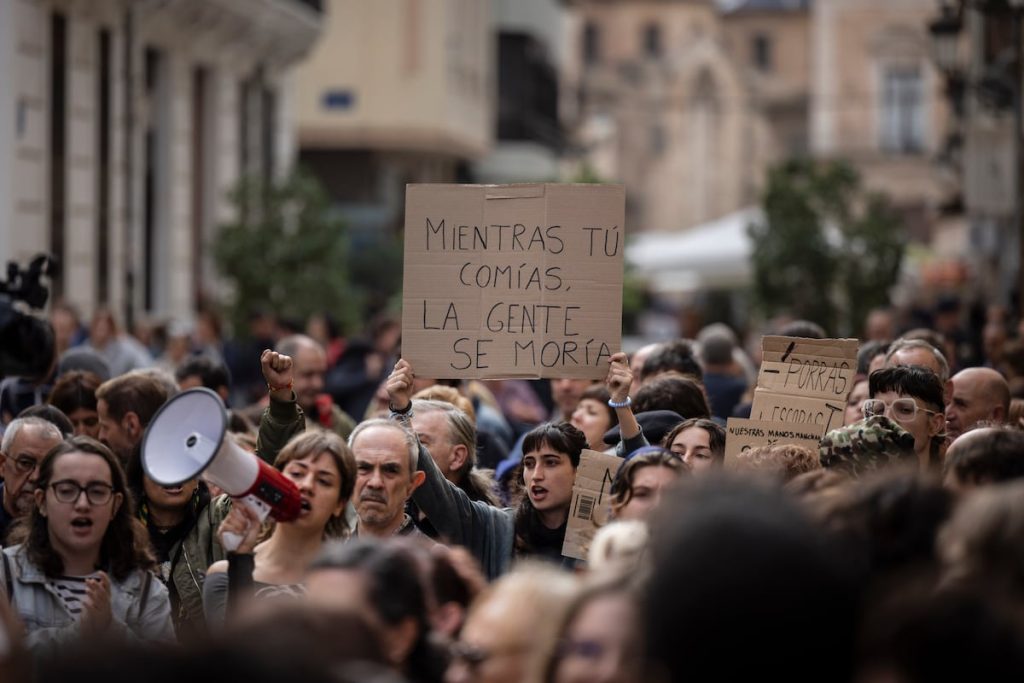Six national police officers begin to cordon off the area as pawns on a chessboard: “Ma’am, this way, this way.” And there is Laura Giménez, a resident of Paiporta, the ground zero of a massive flood nearly two meters high that devastated the businesses and lower levels of this Valencian town of 25,000 residents. “We’re living in the mud!” shouts Giménez, 53, in the middle of the cobblestone and sunny San Lorenzo square in Valencia, in front of the headquarters of the Valencian Parliament and just minutes before Carlos Mazón speaks inside. “People died because they didn’t warn us!” insists Giménez. “Classes weren’t canceled! People were shopping! We were living a normal life! And now I have no home! I have no job! And I almost lost my family.” Photographers, journalists, and TV cameras gather to hear Giménez’s story, a redhead in light jeans and black glasses, one of the many affected by the flood that has paralyzed the province of Valencia since October 29th.
Giménez is joined by two other protesters, Dolores Aranda, 64, and Asun Alcocer, 48. “Anyone in Valencia knows we need to watch the sky,” explains Alcocer, who works in an optician and saw the storm on TV at home. “All the human losses are his fault. This man is a criminal. He prioritized economic activity over life.” 20 minutes later, the protesters reach a hundred and the chants begin unanimously: “Mazón, resign, come out of hiding!” Blanca Guarner, 23, a Philosophy student at the University of Valencia and a volunteer these days, is one of them. She says she has friends who lost their jobs in the area. “The politicians are negligent. People died.” Guarner brought a white megaphone and a piece of paper with handwritten slogans in Valencian: “Murderers, murderers, murderers.” “Only the people save the people.” “Valencia bleeds, the PP is silent.” “Mazón, resign.” “It’s going to end, criminal negligence.”
The demonstration, which lasted almost 90 minutes, lost momentum as the president spoke. Only the Almendros sisters, journalists, camera crews, and a group of 30-40 protesters remained. The Almendros sisters were the only ones who followed Mazón’s appearance with a black wireless speaker connected to their phones. “I brought it in case he resigns, so we can all find out,” explains Laura, 37. The sisters liven up the protest by singing Rata de Dos Patas by Paquita la del Barrio. The cardboard signs are placed on the ground: “Mazón, you’re scary.” “Feijóo and Mazón, move forward.” “While you were eating, people were dying.” And outside, a neighbor places a black cardboard sign in the window: “Mazón, resign.”
The protest continues as more participants arrive, with people sharing their experiences of loss and frustration. The manifestation, a mix of anger and sorrow, seeks to hold the authorities accountable for the lack of warning and response to the devastating flood. The protesters demand justice and action to prevent similar tragedies in the future. The atmosphere is tense, but also filled with a sense of solidarity and community as everyone comes together to demand change and support those affected by the disaster. The aftermath of the flood leaves a trail of destruction and heartache, with families struggling to rebuild their lives and businesses. The call for accountability and responsibility is loud and clear in the streets of Valencia, as the protesters refuse to stay silent in the face of negligence and incompetence.


